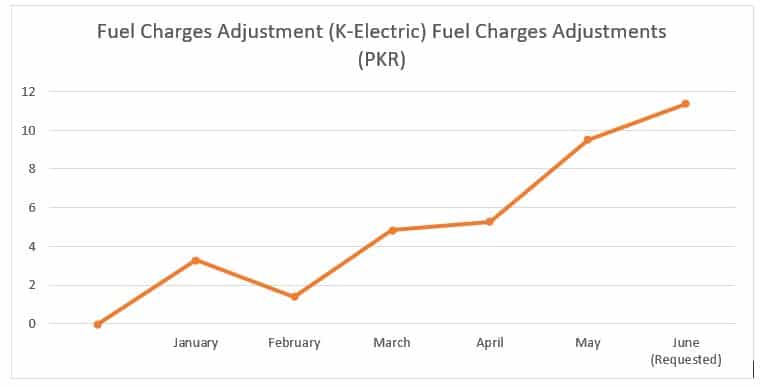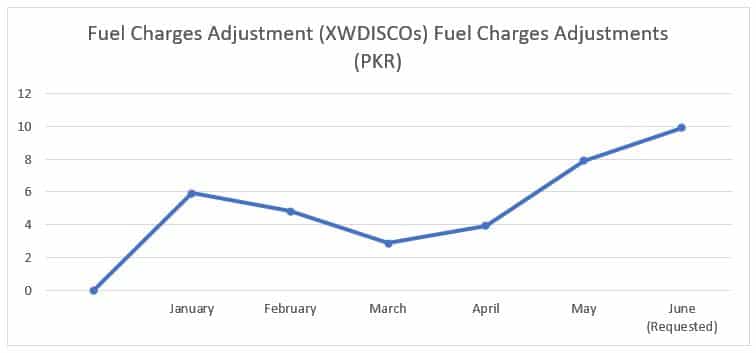Pakistan is presently under extreme economic stress as the current account deficit continues to rise, and the exchange rate is under constant pressure triggering a storm of inflation. Almost every social class is affected by the rising cost of living these days, but sky-rocketing power bills have become a major concern for all.
In just a year’s time, Pakistan’s electricity generation cost is said to have gone up by a whopping 160%, putting a severe strain on consumers’ propensity to pay. But what is causing the cost of power to go this high?
The answer lies in Pakistan’s heavy reliance on imported fuel for power production. The country generates nearly a third of its power from imported fuels such as furnace oil, coal, and liquefied natural gas (LNG). With the value of the Pakistani rupee on a downhill slope and the geopolitical situation increasing the prices of imported fuel sources, electricity bills are also rising at a historic rate across the country.
While the base tariff of electricity seldom changes, one variable component that is increasingly giving a hike to electricity bills is Fuel Charges Adjustments (FCAs).
What Are Fuel Charges Adjustments (FCAs)?
As per a mechanism set by the National Electric Power Regulatory Authority (NEPRA), the variance in fuel costs is passed on to the consumers directly in their monthly bills following NEPRA’s scrutiny and approval.
Fuel charge adjustments (FCA) is a method through which electricity production price is adjusted against the price of fuel used for power production in a month. As per this mechanism set by the National Electric Power Regulatory Authority (NEPRA), the variance in fuel costs is passed on to the consumers directly in their monthly bills following NEPRA’s scrutiny and approval. Since FCAs are based upon the total units generated, these are requested upon completion of a month.
Per the procedure, the Central Power Agency Guarantee (CPPA-G) files a petition for fuel charges adjustment on behalf of EX-WAPDA Distribution Companies (XWDISCOs), while K-Electric files the petition for itself before NEPRA. Based on the petition, NEPRA conducts its scrutiny followed by a public hearing for both entities separately, after which it decides what per unit cost to be passed on to consumers on account of fuel charges adjustments and during which period. One crucial element of FCA is that it is charged to consumers in retrospect.
For the sake of clarity, NEPRA conducted an FCA hearing in the month of April 2022 for XWDISCOs and K-Electric on 31 May 2022 and 14 June 2022, respectively. The decision for XWDISCOs was announced on 13 June 2022, whilst for K-Electric, the decision was announced on 24 June 2022.
In its decision, NEPRA announced that XWDISCO consumers would be charged PKR 3.992 per unit used in April 2022, and the cost would reflect in the billing month of June 2022. On the other hand, in its decision for K-Electric, NEPRA announced that the consumers would be charged PKR 5.271 per unit used in April, and the cost would reflect in the billing month of July.
Now, for example, if consumers of XWDISCOs and K-Electric have used 600 units in the month of April 2022:
| Distribution Company | Units used in April | FCA to be charged in April (PKR) | Total FCA (PKR) |
| Consumer (XWDISCOs) | 600 | 3.992 | 2,395.2 (in June) |
| Consumer (K-Electric) | 600 | 5.271 | 3,162.6 (in July) |
The Rising Fuel Charges Adjustments
As fuel prices continue to rise on a global scale, the fuel adjustments are also constantly going upwards. In just the last 06 months, fuel adjustments have increased manifold.
| Fuel Charges Adjustment (K-Electric) | ||
| FCA Month | Fuel Charges Adjustments (PKR) | Month in which FCA is reflected |
| January | 3.27 | April |
| February | 1.386 | May |
| March | 4.82 | June |
| April | 5.27 | July |
| May | 9.51 | July and August |
| June (Requested) | 11.38 | Yet to be announced |

| Fuel Charges Adjustment (XWDISCOs) | ||
| FCA Month | Fuel Charges Adjustments (PKR) | Month in which FCA is Reflected |
| January | 5.94 | March |
| February | 4.85 | April |
| March | 2.86 | May |
| April | 3.92 | June |
| May | 7.9 | July |
| June | 9.9 | Yet to be announced |

The Way Forward
In order to save the masses from being burdened under the load of the rising cost of electricity, the relevant authorities must ensure that the power sector is provided with indigenous resources on a priority basis so that its dependence upon foreign fuel can be reduced.
In order to save the masses from being burdened under the load of the rising cost of electricity, the relevant authorities must ensure that the power sector is provided with indigenous resources on a priority basis so that its dependence upon foreign fuel can be reduced. Until that happens, an effective energy conservation campaign must be designed on a national scale to make the masses aware of ways through which they can reduce their energy consumption. Thus, their power bills can also be brought down.

